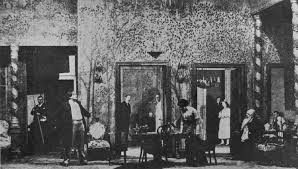Month: July 2016
-
The Limits of Political Power
Mathias Albert in “On the Modern Systems Theory of society and IR,” discusses research that shows that international politics can no longer be described as the mere interaction of foreign policies, but can be conceived as functional politics in the sense that it orients political processes towards the processing of functionally defined problems–and not towards the…
-
Corpus mysticum, Stefan Rossbach essay
Contemplating the history of Western philosophy, Luhmann noted that 2,000 years of searching for “essence” had led to universal problematization of identity, unity, stability or of being in general. From now on, identity had to be understood as a system, i.e., as a structured openness to other possibilities. It is important to appreciate that Luhmann’s…
-
Ngrams and Cultural Memory
Google Ngrams are one way to track cultural memory. In systems theoretical terms, cultural memory is carried by the mass media, which includes books. Below is a search of Chinese terms in Google Books, 1900-2008. Politics 政治 is blue. Economy 经济 is red. Economy overtakes politics in 1975. 1966-76–Decade of the Cultural Revolution, although Mao declared it over…
-
People and Society
People exist in society as topics of communication. As King and Thornhill (2003) write, For Luhmann, people . . . exist for and within social systems only in so far as these systems are able to communicate about them.. . . People do exist in the form of ‘the public,’ ‘individuals’, ‘reasonable men’, ‘rational beings’.…
-
Unintended Consequences
The Los Angeles Times has a interesting article on the differences between the US and France when it comes to multiculturalism. While the US government, at least as it’s written in the Constitution and laws, basically ignores religion, France has attempted to create a unified French people–an imagined community where everyone accepts French secular culture. Assimilation…
-
The Rise of Politics
Here is a Spanish Google Ngram for law, politics, religion,economy, and the press. These kinds of graphs don’t necessarily show what was most important to most people, but do they show what writers and readers of books were interested in, or where the main disputed questions lay. For the Spanish terms, the first thing of interest is the…
-
Notes on Anders Esmark (2004). “Systems and Sovereignty”
Anders Esmark (2004). “Systems and Sovereignty: A systems theoretical look at the transformation of sovereignty.” Observing International Relations: Niklas Luhmann and World Politics. Edited by Mathias Albert & Lena Hilkermeier. Routledge. I don’t have access to the book yet, just part of it from Google Books. But what I’ve been able to read so far is very good.…
-

Anton Chekhov’s The Cherry Orchard and social system change
Modern, functionally differentiated society is not held together by moral consensus, shared values, or shared goals. Modern society is far too complex for that. Instead, modern global society is “held together,” or reproduced from moment to moment, by a division of labor on a large scale. That is to say, post-eighteenth-century global society has divided the…
-
Jonathan Franzen – Freiheit
Originally posted on 1001 BÜCHER: “Warum die Konservativen, die doch immerhin alle drei Gewalten der Bundesregierung dominierten, noch immer so in Rage waren – auf respektvolle Zweifler am Irakkrieg, auf schwule Paare, die heiraten wollten, auf den faden Al Gore und die vorsichtige Hillary Clinton, auf gefährdete Arten und deren Fürsprecher, auf Steuern und Benzinpreise,…
-

Rationality, Cognition, and Anti-Humanism
Luhmann is called an “anti-humanist” not because he was against humans (he was not a misanthrope) but because he was against humanism; he was against taking the human being as the center of the universe. And Luhmann was not just a post-humanist because, for him, humanism was mistaken from the start. In Niklas Luhmann’s Theory of Politics and Law,…